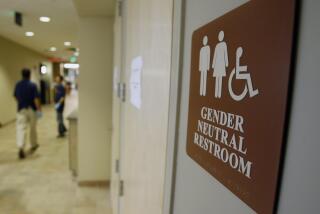School Prayer Amendment Approved by Senate Panel
- Share via
WASHINGTON — The Senate Judiciary Committee on Thursday approved and sent to the full Senate a proposed constitutional amendment that would allow a moment of silent prayer in public schools.
After several weeks of parliamentary wrangling, the committee voted 12 to 6, with four Democrats and two Republicans dissenting, to send the controversial proposal to the full Senate.
No Debate Scheduled
A constitutional amendment must be approved by both houses of Congress and ratified by 38 states before it becomes law. The Senate has not scheduled debate on the proposal.
Sen. Paul Simon (D-Ill.), an opponent of the amendment, said that there is no “secular purpose for having this.”
“The aim is to promote religion. I don’t think this is something the federal government should get involved in,” he said.
The amendment, written by Sen. Orrin G. Hatch (R-Utah), states: “Nothing in this Constitution shall be construed to prohibit individual or group silent prayer or reflection in public schools. Neither the United States nor any state shall require any person to participate in such prayer or reflection, nor shall they encourage any particular form of such prayer or reflection.”
Rejected Prayer Bill
In September, the Senate decisively rejected legislation designed to allow organized, recited prayer in public schools. That bill would have prohibited the federal courts, including the Supreme Court, from hearing any case involving prayer in public schools.
The Senate has voted on similar legislation nearly a dozen times in the last seven years, but the September vote indicated the least support for school prayer since 1979.
A 1962 Supreme Court decision banned state-sponsored public school prayer. Last June, the court struck down an Alabama law authorizing a one-minute period of silence in schools for “meditation or voluntary prayer.”
No Mandatory Obligation
Hatch said his proposed amendment would allow silent prayer or meditation and would not impose a mandatory obligation to pray.
Opponents of government-organized prayer or meditation sessions argue that children individually are free to pray whenever they choose in school but involvement of government, in the form of the state or teachers, violates the separation of church and state provisions of the Constitution.
Senators Opposed
The amendment was opposed by Republican Sens. Charles McC. Mathias Jr. of Maryland, who is retiring from the Senate, and Arlen Specter of Pennsylvania, who faces a tough reelection contest next year.
Democrats opposing the proposal, in addition to Simon, were Sens. Edward M. Kennedy of Massachusetts, Howard M. Metzenbaum of Ohio and Patrick J. Leahy of Vermont.
More to Read
Get the L.A. Times Politics newsletter
Deeply reported insights into legislation, politics and policy from Sacramento, Washington and beyond. In your inbox twice per week.
You may occasionally receive promotional content from the Los Angeles Times.










